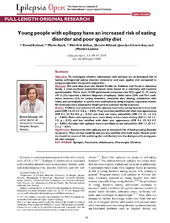| dc.description.abstract | Objective: To investigate whether adolescents with epilepsy are at increased risk of having self‐reported eating disorder symptoms and poor quality diet compared to young people from the general population. Methods: We used data from the Health Profile for Children and Youth in Akershus Study, a cross‐sectional population‐based study based on a voluntary self‐reported questionnaire. There were 19,995 participants (response rate 85%) aged 13–19 years; 247 (1.2%) reported a lifetime diagnosis of epilepsy. Odds ratios (OR) and 95% confidence intervals (CI) for eating disorders, unhealthy diet, dieting, satisfaction with looks, and participation in sports were estimated by using a logistic regression model. All estimates were adjusted for single parents and poor family economy. Results: Children and adolescents with epilepsy had more eating disorders than their peers (OR 1.8, CI 1.0–3.0, p = 0.03). They were less satisfied with their own appearance (OR 0.7, CI 0.5–0.9, p = 0.02), and they eat more unhealthily (OR 1.7, CI 1.3–2.2, p = 0.001). Males with epilepsy were more likely to have been dieting (OR 3.1, CI 1.2–7.9, p = 0.02) and less satisfied with their own appearance (OR 0.4, CI 0.3–0.7, p < 0.001). Females with epilepsy were more likely to eat unhealthily (OR 1.7, CI 1.1–2.5, p = 0.01). Significance: Adolescents with epilepsy are at increased risk of having eating disorder symptoms. They eat less healthily and are less satisfied with their looks. Health workers should be aware of this and bring diet and lifestyle into the dialogue with young people with epilepsy. | en_US |

